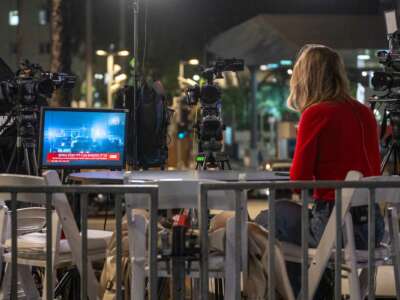The company has implemented “sweeping bans” on content supporting Palestinian rights, the group’s report found.
By Sharon Zhang ,
December 21, 2023

A close-up of a finger is pointing to the Facebook mobile app on a smartphone screen, which is displayed alongside other apps including Instagram, WhatsApp, Telegram, TikTok, Tinder, YouTube, and Messenger, on November 30, 2023.
JONATHAN RAA / NURPHOTO VIA GETTY IMAGES
2024 is going to be the most important year yet for fearless, trustworthy journalism. Will you make a tax-deductible, end-of-year donation to support our work? Any amount you give will be matched!
Meta, the company that owns Facebook and Instagram, has been censoring posts from pro-Palestine voices, a new analysis from Human Rights Watch finds, lending evidence to what many advocates for Palestinian rights have suspected since Israel’s current assault began.
Human Rights Watch analyzed posts on Facebook and Instagram from over 60 countries and found that the platforms have been taking down posts in support of Palestine for erroneous reasons. This censorship is “systemic and global,” Human Rights Watch writes in its 51-page report.
The report finds several underlying reasons driving the censorship: inconsistent enforcement of Meta’s content policies, automated content removal, granting requests from governments to remove certain content, and “sweeping bans” on so-called “terrorist” activity — seemingly using definitions that liken all support of Palestinian rights to “terrorism,” a dangerous conflation that has been increasingly common in the past months.
The group found 1,050 cases of censorship on Instagram and Facebook, with 1,049 of the posts supporting Palestine and one post being taken down in support of Israel. Even Human Rights Watch’s post calling for evidence of censorship appeared to be suppressed, the report finds, with dozens of users reporting being unable to interact with the post.
Censorship took several forms, the report found. Researchers documented over 100 cases each of posts being taken down, accounts being suspended or disabled, account activity being restricted in various ways, like being unable to “like” posts or follow accounts, and “shadow banning,” in which the reach of an account is severely limited without the user being formally notified.
2024 is going to be the most important year yet for fearless, trustworthy journalism. Will you make a tax-deductible, end-of-year donation to support our work? Any amount you give will be matched!
Meta, the company that owns Facebook and Instagram, has been censoring posts from pro-Palestine voices, a new analysis from Human Rights Watch finds, lending evidence to what many advocates for Palestinian rights have suspected since Israel’s current assault began.
Human Rights Watch analyzed posts on Facebook and Instagram from over 60 countries and found that the platforms have been taking down posts in support of Palestine for erroneous reasons. This censorship is “systemic and global,” Human Rights Watch writes in its 51-page report.
The report finds several underlying reasons driving the censorship: inconsistent enforcement of Meta’s content policies, automated content removal, granting requests from governments to remove certain content, and “sweeping bans” on so-called “terrorist” activity — seemingly using definitions that liken all support of Palestinian rights to “terrorism,” a dangerous conflation that has been increasingly common in the past months.
The group found 1,050 cases of censorship on Instagram and Facebook, with 1,049 of the posts supporting Palestine and one post being taken down in support of Israel. Even Human Rights Watch’s post calling for evidence of censorship appeared to be suppressed, the report finds, with dozens of users reporting being unable to interact with the post.
Censorship took several forms, the report found. Researchers documented over 100 cases each of posts being taken down, accounts being suspended or disabled, account activity being restricted in various ways, like being unable to “like” posts or follow accounts, and “shadow banning,” in which the reach of an account is severely limited without the user being formally notified.
RELATED STORYCorporate media outlets have treated Palestinian suffering as a nonstory for many decades.By Andy Lee Roth & Mickey Huff , TRUTHOUTDecember 2, 2023
“Meta’s censorship of content in support of Palestine adds insult to injury at a time of unspeakable atrocities and repression already stifling Palestinians’ expression,” Deborah Brown, acting associate technology and human rights director for Human Rights Watch, said in a statement. “Social media is an essential platform for people to bear witness and speak out against abuses while Meta’s censorship is furthering the erasure of Palestinians’ suffering.”
The findings represent a small sample of the number of instances of censorship, the group said, with Human Rights Watch receiving hundreds more reports from users after the report was finalized. The report isn’t a representative sample, the report said, meaning that it can’t be extrapolated to make conclusions about Meta’s censorship practices across their entire platforms.
It is a show, however, that the company is taking steps to suppress information about Israel’s genocidal assault on Gaza in a time when many institutions are working to silence people who speak up in favor of Palestine. On top of the recurring communications blackouts in Gaza and the near-constant flow of disinformation on Israel’s massacre, these institutions and companies have worked to muddy the waters of the assault, in which over 20,000 Palestinians have been killed and people in Gaza are staring down the barrel of issues of rapidly worsening hunger and disease across the region.
This has long been a practice within Meta, Human Rights Watch researchers have found. A similar report done by the group in 2021 found that Facebook was removing content by Palestinians and pro-Palestinian voices. Meta commissioned an independent report probing the issue in response to the report, but despite recommendations that the company change its policies to avoid censoring content supporting Palestinian rights, the company has still not made sufficient changes, the group said.
This article is licensed under Creative Commons (CC BY-NC-ND 4.0), and you are free to share and republish under the terms of the license.

SHARON ZHANG is a news writer at Truthout covering politics, climate and labor. Before coming to Truthout, Sharon had written stories for Pacific Standard, The New Republic, and more. She has a master’s degree in environmental studies. She can be found on Twitter: @zhang_sharon.
Human Rights Watch reports content in support of Palestine on Meta being censored
Human Rights Watch released a new report on the patterns of censoring pro-Palestinian content on Meta, specifically Instagram and Facebook. Their report came after reviewing over 1,000 cases and finding more than 30% of the content or action taken was without appeal. The censorship consisted of removal of content, suspension of accounts, restrictions on features like Instagram and Facebook Live, and shadow banning. Human Rights Watch is sending a clear message to Meta: 'Stop silencing support for Palestine.
December 23, 2023
December 23, 2023

No comments:
Post a Comment